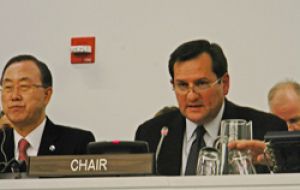MercoPress. South Atlantic News Agency
Special Committee of 24 scheduled to hold Pacific Regional Seminar in Ecuador
 The Week of Solidarity with the Peoples’ of the Non-Self-Governing Territories will also be celebrated at the seminar said Committee Chairman Diego Morejón
The Week of Solidarity with the Peoples’ of the Non-Self-Governing Territories will also be celebrated at the seminar said Committee Chairman Diego Morejón The United Nations Special Committee on Decolonisation — also known as the Special Committee of 24 — is to hold its Pacific Regional Seminar in Guayaquil, Ecuador, from 28 to 30 May. Its agenda is to review progress in the United Nations decolonisation process.
The Seminar will seek to assess the past decade and focus on goals and expected accomplishments in decolonisation over the coming years within the framework of the Third International Decade for the Eradication of Colonialism (2011-2020), which was declared by the General Assembly in December 2010.
“Discussions at the seminar will assist the Special Committee in making a realistic analysis and evaluation of the situation in the Non-Self-Governing Territories, on a case-by-case basis, as well as the ways in which the United Nations system and the international community at large could enhance programs of assistance to the Territories. The Seminar’s conclusions and recommendations will then be considered at the Committee’s substantive session in June and were expected to be transmitted to the General Assembly,” said a UN spokesman.
Committee Chairman Diego Morejón (Ecuador) said that, as in the past, the Committee would also celebrate the Week of Solidarity with the Peoples’ of the Non-Self-Governing Territories at that Seminar.
The Seminar’s participants will include a formal delegation of the Committee, United Nations Member States, representatives of the Non-Self-Governing Territories, the nations administering them, as well as experts from civil society and non-governmental organisations.
The Committee agreed that the composition of its eight-member delegation to the seminar will include members representing the four regional groups: the African Group; the Asia-Pacific Group; the Eastern European Group, represented by the Russian Federation, as the only member in that group; and the Group of the Latin American and Caribbean States; all of which were still consulting with regard to their respective nominations.
The Committee’s second meeting for 2013 endorsed English and Spanish as the official languages to be used, among other guidelines and rules of procedure.
Opening the 2013 substantive session of the Special Committee on Decolonisation, Secretary-General Ban Ki-moon in February called on the C24 to devise “fresh and creative” approaches in mobilising the political will needed to eradicate colonialism, saying it had no place in the modern world.
“It is time for a new kind of fully inclusive dialogue about decolonisation,” he said, adding: “We no longer have the luxury of indulging in rhetoric and rituals.” The risk of movement, while sometimes frightening, was preferable to the stagnation of the status quo, he said.
Urging the Special Committee to review its practices so as to “maximise its effectiveness”, the Secretary-General said the common endeavour of eradicating colonialism required its “constructive involvement” with the Non-Self Governing Territories under its purview and with their respective administering Powers.
The members of the Committee are Antigua and Barbuda, Bolivia, Chile, China, Congo, Côte d’Ivoire, Cuba, Dominica, Ecuador, Ethiopia, Fiji, Grenada, India, Indonesia, Iran, Iraq, Mali, Nicaragua, Papua New Guinea, Russian Federation, Saint Kitts and Nevis, Saint Lucia, Saint Vincent and the Grenadines, Sierra Leone, Syria, Timor-Leste, Tunisia, United Republic of Tanzania and Venezuela.
At present, 16 Non-Self-Governing Territories across the world remain to be decolonised, home to nearly 2 million people, said the UN statement. Those territories are American Samoa, Anguilla, Bermuda, British Virgin Islands, Cayman Islands, Falkland Islands (Malvinas), Gibraltar, Guam, Montserrat, New Caledonia, Pitcairn, Saint Helena, Tokelau, Turks and Caicos Islands, United States Virgin Islands and Western Sahara.




Top Comments
Disclaimer & comment rules-

-

-

Read all commentsFirst chance for the committee to show the world that they understood what ban ki moon was telling them.
Apr 17th, 2013 - 09:11 am 0(tenner says they flunk it - spectacularly)
So the Pacific regional seminar would be dealing with:
Apr 17th, 2013 - 09:18 am 0American Samoa (which hasn't expressed any wishes to be any more “independent” than it already is - has its own constitution, its own parliament, its own legal system etc)
Guam (which has a significant political movement to make it more a part of the US rather than less)
New Caledonia (which when last asked voted to stay an overseas territory of France, despite what the local politicians wanted).
Pitcairn (which really doesn't have the population to be practically independent and doesn't want to be independent either)
and Tokelau (which has had two referenda on independence in the last decade, sponsored by the C24, neither of which actually achieved the required majority)
Sounds like a pleasant jolly for the committee-of-no-verifiable-results for them to talk lots and accomplish the square root of bugger all. I'm sure that it will be a magnificent success in their press releases.
Is this the 4th decade of the end of colonialism? lol the C24 committee is the biggest waste of money in the UN has (and they waste a lot!).
Apr 17th, 2013 - 10:57 am 0Dear UN you can remove the 10 British BOT's they are NOT non-self governing, get with the time you dinosaurs!.
Commenting for this story is now closed.
If you have a Facebook account, become a fan and comment on our Facebook Page!